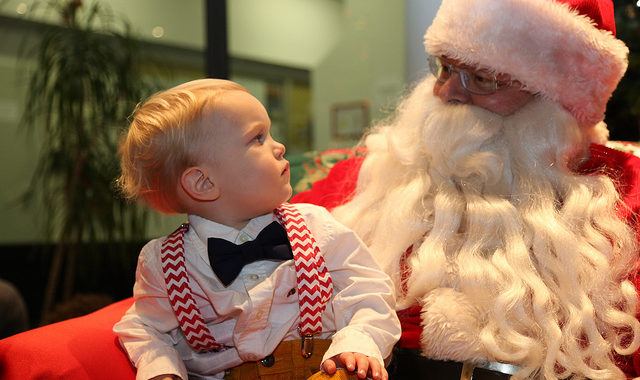With the holiday season fast approaching many of us find our calendars filling up with family get together, child activities, holiday parties, shopping and decorating our homes.
For some of us, this time of year is filled with excitement and anticipation as we connect with others and celebrate the season. We look forward to seeing family and friends from out of town and holding the new babies. For others, this time of year creates worries and anxiety as we encounter strained family relations. We enter stressful family situations that cause us to be irritable which impacts our interactions with our children and others.
If you are a divorced parent, you have the added stress of supporting your child in attending multiple events with each family and making the adjustment to changes in the parenting schedule. And amid all of this in the back of our minds is the dread that our children will misbehave at an outing or be grouchy resulting in the entire family being miserable.
Below you will find some tips on managing some of the typical encounters we all experience during the holiday season. Above all, remember that planning ahead can help alleviate the stress often experienced during the holidays.
Work With Your Child To Manage Expectations
Be sensitive to your child’s age and developmental abilities when selecting activities to participate in. If you choose age appropriate activities then you can expect more appropriate behavior from your child.
- Be clear about your child’s behavior but don’t expect perfection. Before attending an event, remind your child of your expectations for their behavior. Identify two or three key points to share with them each time as a way to stay focused on positive behavior. Use noticing statements to communicate to them that you see the positive behaviors. An example of a noticing statement would be—”I noticed that you have used please and thank you with the adults or I see you playing and taking turns with the other children.” It is important when using noticing statements that you be specific about the positive behavior you are seeing to reinforce the expectations that you set prior to attending the event.
- Identify any anxiety you may have about encounters with relatives and utilize some coping skills to manage the anxiety. Your energy will impact your child’s behavior.
- Maintain your own self-care schedule of exercise or physical movement, healthy eating and sleeping patterns, and hobbies or interests. Use coping skills such as journaling, talking to someone and listening to music to manage your own emotions or stress.
Maintain A Schedule And Plan For Age Appropriate Activities
Avoid the “cranky child syndrome” by keeping your children on a regular schedule. Your child will do best if you keep to regular routines, especially around eating and sleeping. Try to plan around nap time and bedtime if at all possible. This may mean telling relatives that you will be arriving late or leaving early.
- Build in time for your child to play or participate in typical activities that interest him or her. If your child is involved in mostly adult activities then managing behavior becomes more difficult.
- Be sure to allow some quiet, relaxed family time during the holiday season. Everyone can use some down time, adults included.
- If traveling, create a travel bag with activities for each child to use while in the car, plane or train.
Participate In Family Traditions
- If you decorate a Christmas tree, let young children handle safe, unbreakable ornaments and place them on lower branches in order to be a part of the tradition. Also, let them take the ornaments off and put them back on again. Identify decorations that older children can be responsible for and allow them input in where to place them in the home.
- Participate in activities that your children can enjoy. Make gifts, cards or make some simple goodies that can be shared with friends and neighbors.
- Try to develop some new traditions with your children. Identify activities that might interest members of your family that you could consider doing together like reading a special book, create a specific time for a family activity, or use a counter to countdown to Christmas Day.
- Give the gift of giving to help your child look outside of themselves during this holiday season.
- As a parent, try to find the “child” in yourself. Permit yourself to share in a child-like activity.
Provide Support For Any Meltdowns
Give your child warnings prior to any transitions from activities or if leaving a location. Amid the excitement, your child will need some notice that a change is coming as energy levels and moods will vary based on stimulation.
- Provide some adult supervision for social play between children if they haven’t had experience playing together. Facilitate any social disagreements during their play to support children in learning how to get along together. It is an unreal expectation to think that children will get along perfectly if they have little experience in playing together or if they are hungry or tired.
- If your child has a meltdown, give her some space rather than crowding her. Tell yourself to remain calm and take some deep breathes. Guide your child to take deep breaths to calm. Acknowledge what your child might be feeling and give her a chance to tell her story. After listening and again acknowledging her feelings, move to problem-solving steps if needed to help resolve the issue.
Support For Divorced Families With Children
Communicate changes in the typical schedule with your child due to the holiday parenting schedule or due to holiday plans. With younger children, consider using a calendar to mark time with each parent so they can see the plan.
- As each parent is identifying plans with family, take time to consider the schedule with the other parent as a too busy schedule can overwhelm children and cause unpleasant experiences for all.
- When planning the schedule, allow your child time to play with new gifts or visit with family. If you overschedule your child, it can lead to disappointment for your child if he receives a gift and doesn’t have time to play with it or doesn’t have time to play with cousins.
- Each parent should take time to communicate about sleep and eating patterns especially for younger children as holiday plans sometimes cause adjustments to traditional schedules. This small step in communication can make experiences for your child more pleasurable.
- Set aside your own feelings and emotions and keep the focus on creating pleasant experiences for your children.
 Amy Thompson is a child and family therapist at Rejuvenate Mind-Body Wellness Center in Lee’s Summit, Mo. She works with children, adolescents and their families. Amy has received training in Conscious Discipline by attending Conscious Discipline Institute I and II. If you are experiencing needing help with learning how to support your child, whether due to school, divorce, death, or new siblings, Amy Thompson can help.
Amy Thompson is a child and family therapist at Rejuvenate Mind-Body Wellness Center in Lee’s Summit, Mo. She works with children, adolescents and their families. Amy has received training in Conscious Discipline by attending Conscious Discipline Institute I and II. If you are experiencing needing help with learning how to support your child, whether due to school, divorce, death, or new siblings, Amy Thompson can help.




